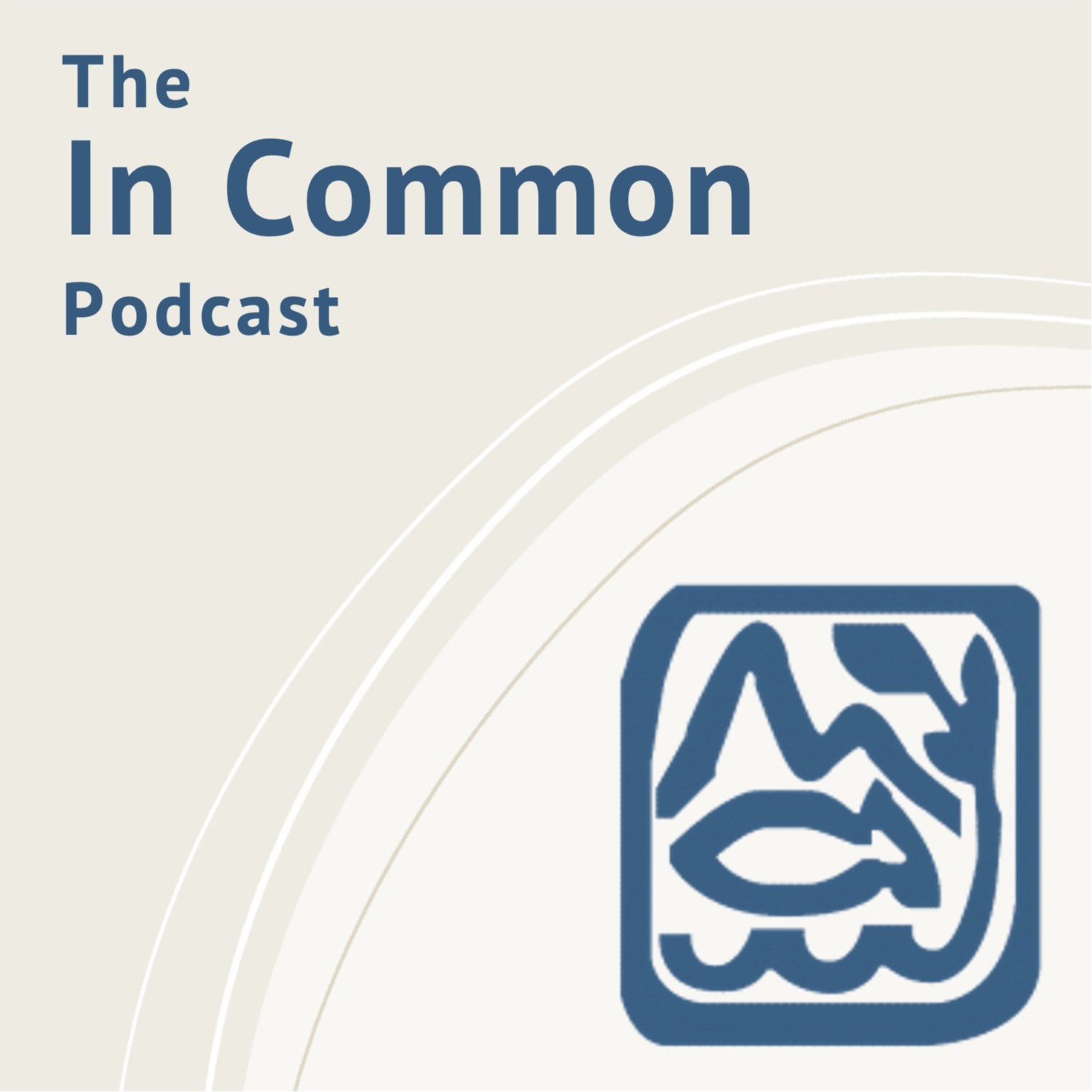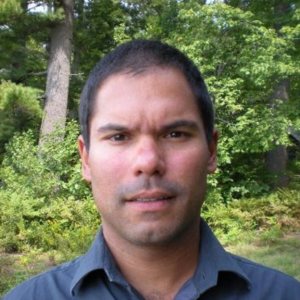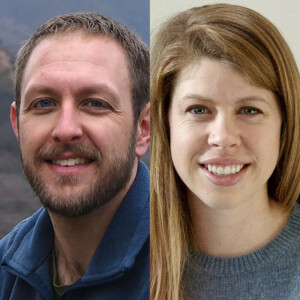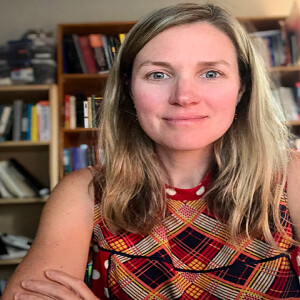
105.2K
Downloads
238
Episodes
In Common explores the connections between humans, their environment and each other through stories told by scholars and practitioners. In-depth interviews and methods webinars explore interdisciplinary and transdisciplinary work on commons governance, conservation and development, social-ecological resilience, and sustainability.
In Common explores the connections between humans, their environment and each other through stories told by scholars and practitioners. In-depth interviews and methods webinars explore interdisciplinary and transdisciplinary work on commons governance, conservation and development, social-ecological resilience, and sustainability.
Episodes

Friday Jan 06, 2023
Insight Episode #47: Nejem Raheem on water rights in the New Mexico acequias
Friday Jan 06, 2023
Friday Jan 06, 2023
This insight episode comes from full episode eighty-one with Nejem Raheem.
Nejem is an associate professor of economics at Emerson College, where he focuses on the economics of natural resource and environmental issues.
Nejem speaks with Michael about the similarities between his childhood experiences in Bangladesh and Nepal and the New Mexico acequias. The two discuss their work on the acequias and the complexity of the systems based upon western codifications of water rights and the subsequent valuation given to water in the US, and how this lacks a complete valuation of the social importance of water in the acequias.
Nejem's website: https://www.emerson.edu/faculty-staff-directory/nejem-raheem
References:
Raheem, N., S. Archambault, E. Arellano, M. Gonzales, D. Kopp, J. Rivera, S. Guldan, et al. 2015. “A Framework for Assessing Ecosystem Services in Acequia Irrigation Communities of the Upper Río Grande Watershed.” WIREs. Water 2 (5): 559–75. https://doi.org/10.1002/wat2.1091.

Friday Dec 16, 2022
Insight Episode #46: Arun Agrawal on top down v. bottom up governance
Friday Dec 16, 2022
Friday Dec 16, 2022
This insight episode comes from full episode eighty with Arun Agrawal.
Arun is the Samuel Trask Dana Professor at the School for Environment and Sustainability at the University of Michigan, and he has played an important role in the development of the Commons field and related areas of conservation and development.
Arun talks with Michael and Stefan about top-down versus bottom-up governance, and how people’s identity informs how they view the world. Arun also discusses how comanagement is not just a category, but a descriptor of the world around us, and the importance of understanding nuance rather than looking for binaries.
Arun’s website: http://www.arunagrawal.org/

Tuesday Dec 13, 2022
111: Fisheries policy and catch shares with Dan Holland
Tuesday Dec 13, 2022
Tuesday Dec 13, 2022
In this episode, Michael speaks with Dan Holland. Dan is a senior scientist at the Northwest Fisheries Science Center within the US National Oceanic and Atmospheric Administration, or NOAA. Dan joined the Northwest Fisheries Science Center in 2010. Prior to that he held positions with the Gulf of Maine Research Institute, the New Zealand Seafood Industry Council, the University of Massachusetts Dartmouth, and the Alaska Fisheries Science Center. He is an affiliate professor at the University of Washington, Chair of the Science and Statistical Committee of the Pacific Fishery Management Council, an associate editor of Marine Resource Economics, and is a former President of the International Institute for Fisheries Economics and Trade (IIFET).
Michael and Dan talked about several aspects of Dan’s research, which is focused primarily on design and evaluation of fishery management tools and strategies. In particular, they discussed Dan’s research related to catch share policy, which involves placing a cap on the total allowable catch (TAC) for a species and a distributing a tradeable quota that is allocated to a group of fishers in proportion to this cap. These policies have been both quite popular and controversial, and Dan’s research can help us think about the mechanics of some of the most critical issues involved, including how to balance the costs and benefits of individual vs. collective fishing rights, options for limiting bycatch and dealing with choke species via quota pooling, and how to these relate to the idea of ecosystem management.
Dan’s website: https://www.fisheries.noaa.gov/contact/dan-s-holland-phd
References:
Holland, Daniel S. 2010. “Markets, Pooling and Insurance for Managing Bycatch in Fisheries.” Ecological Economics: The Journal of the International Society for Ecological Economics 70 (1): 121–33. https://doi.org/10.1016/j.ecolecon.2010.08.015.
Holland, Daniel S. 2013. “Making Cents Out of Barter Data from the British Columbia Groundfish ITQ Market.” Marine Resource Economics 28 (4): 311–30. https://doi.org/10.5950/0738-1360-28.4.311.
Holland, Daniel S. 2018. “Collective Rights–Based Fishery Management: A Path to Ecosystem-Based Fishery Management.” Annual Review of Resource Economics 10 (1): 469–85. https://doi.org/10.1146/annurev-resource-100517-023110.
Holland, Daniel S., Joshua K. Abbott, and Karma E. Norman. 2020. “Fishing to Live or Living to Fish: Job Satisfaction and Identity of West Coast Fishermen.” Ambio 49 (2): 628–39. https://doi.org/10.1007/s13280-019-01206-w.
Holland, Daniel S., Cameron Speir, Juan Agar, Scott Crosson, Geret DePiper, Stephen Kasperski, Andrew W. Kitts, and Larry Perruso. 2017. “Impact of Catch Shares on Diversification of Fishers’ Income and Risk.” Proceedings of the National Academy of Sciences 114 (35): 9302–7. https://doi.org/10.1073/pnas.1702382114.

Monday Dec 05, 2022
Monday Dec 05, 2022
IJC#10: Picking a bone with Elinor Ostrom? A conversation with Landon Yoder & Courtney Hammond Wagner
Listen to a conversation that Frank van Laerhoven had with Landon Yoder and Courtney Hammond Wagner.
Together with Kira Sullivan-Wiley and Gemma Smith, Landon and Courtney co-authored a recent IJC publication entitled The Promise of Collective Action for Large-Scale Commons Dilemmas: Reflections on Common-Pool-Resource Theory, an article that reflects on how to apply Ostrom’s design principles to larger-scale and more complex cases than the commons cases that we typically read about.
Their proposition is that there is an over-emphasis on using Ostrom’s design principles diagnostically. They argue that as the environmental challenges that we face today differ from the ones that the design principles were arguably developed for, we need more attention for building theoretical understanding of how collective action can contribute to solving larger-scale challenges where many problems intersect.
Landon is affiliated with the School of Public and Environmental Affairs (SPEA) at Indiana University, Bloomington. He holds a Ph.D. from the Department of Geography from that same university. His work combines both social and natural science data and spatial analysis to examine how biophysical conditions, social dynamics, and institutional arrangements jointly influence environmental change.
Courtney received a Ph.D. in Natural Resources from the University of Vermont, and worked as a postdoctoral scholar in sustainable groundwater at Stanford. She now works for the United States Department of Agriculture (USDA). Courtney’s research broadly aims to understand how we design incentives, rules and policies to collectively change behavior in water resource dilemmas to improve community well-being and ecological outcomes.
In case you want to learn more about topics akin to the topic discussed in this episode, may we suggest you check out some of the other titles in the International Journal of the Commons that also look at, for example:
- Orazgaliyev, S., & Araral, E. (2019). Conflict and cooperation in global commons: Theory and evidence from the Caspian Sea. International Journal of the Commons, 13(2).
- Paavola, J. (2008). Governing atmospheric sinks: the architecture of entitlements in the global commons. International Journal of the Commons, 2(2).
- Stern, P. (2011). Design principles for global commons: Natural resources and emerging technologies. International Journal of the Commons, 5(2).
And of course, you should check out the special issue introducing the Social-ecological systems meta-analysis database (SESMAD) project, put together by Michael Cox. This project is guided by the following research question: can the variables found to be important in explaining outcomes on small-scale systems be scaled up to explain outcomes in large-scale environmental governance?

Monday Nov 28, 2022
110: Carbon markets with Danny Cullenward
Monday Nov 28, 2022
Monday Nov 28, 2022
In this episode, Michael speaks with Danny Cullenward. Danny is a lawyer and climate economist working on the design and implementation of scientifically grounded climate policy. He is the Policy Director at CarbonPlan and a Research Fellow at American University’s Institute for Carbon Removal Law & Policy. He holds a PhD and a JD from Stanford University.
Danny talks with Michael about his book, Making Climate Policy Work , which he co-authored with David Victor. In this book, Danny and David critique the dominance of carbon markets in the climate change policy space. They argue that such markets are layered onto existing regulations that are doing most of the work to mitigate carbon emissions. A central challenge that markets face is that their implementation is highly political and often coopted by those who are regulated.
Danny and David also discuss carbon offset policies, which is essentially a payment for ecosystem services scheme that is often added to carbon market policies to provide regulated actors with an option to pay for carbon sequestration elsewhere to enable them to keep polluting where they are, with the presumption that the carbon budget can balance out. Danny and David are also critical of these, in particular due to their lack of additionality, or the lack of credible proof that the carbon sequestration being paid for is occurring because of the offset program and wouldn’t have happened without it. Danny and Michael conclude the conversation by talking about the future of voluntary carbon markets and the promise of carbon removal technologies.
Carbon Plan website: https://carbonplan.org/
References:
Cullenward, Danny, and David G. Victor. 2020. Making Climate Policy Work. Polity Press.
Badgley, Grayson, Jeremy Freeman, Joseph J. Hamman, Barbara Haya, Anna T. Trugman, William R. L. Anderegg, and Danny Cullenward. 2022. “Systematic over-Crediting in California’s Forest Carbon Offsets Program.” Global Change Biology 28 (4): 1433–45. https://doi.org/10.1111/gcb.15943 (open access)
Propublica reporting on Badgley et al. (2022) article:

Monday Nov 21, 2022
109: Forests as pathways to prosperity with Daniel Miller
Monday Nov 21, 2022
Monday Nov 21, 2022
In this episode, Divya Gupta speaks with Dr. Daniel Miller. Dan is an Associate Professor in the School of Global Affairs at the University of Notre Dame and has been extensively working on the socio-economic, ecological, and political dimensions of forests in tropical countries.
In this conversation, they focus on Dan’s projects on conservation legacy and his other project looking at the role of forests as pathways out of poverty. Later in the episode, they also discuss Dan’s new role as the coordinator of FLARE, which stands for Forest and Livelihoods Assessment, Research, and Engagement.
For his project on conservation legacies, the projects that Dan started as a graduate student in the west Africa region at W National Park, a park that spreads across the countries of Benin, Niger and Burkina Faso, Dan focussed on how protected area governance interfaces with international aid. Interaction on this topic was a great way to explore the critical question of what conservation funding really does for people and protected areas in tropical countries. Dan shares that international aid has disproportionate impacts on people; while it provides new sources of income to some with the creation of jobs in the areas like park management, monitoring, and tourism, these opportunities only extend to some in the community. In fact, with the implementation of conversation projects, and many lose access to the forest, thereby creating more challenges for them. Dan suggests that this happens because the aid has a tendency of what he refers to as— ‘missing the middle’. When implemented, he says that the aid programs often tend to partner with the national government, national park agencies, and forest departments, but rarely or never with the local governments. He says this is a problem because these local governments have a bigger impact on people’s lives. As Dan continues to extend his work on conservation legacies in other countries like Bhutan, Peru, and Madagascar, he is finding that while external intervention in the form of aid in conservation in low-income countries is important, it works best when it is inculcated in the local governance structures and can bring clear benefits to people.
In the discussion on Dan’s parallel project on forest-poverty relationships, where he is working with a large team of scholars looking at the impacts that forests can have on poverty alleviation in low-income countries. Dan shares that the greater vision that he has for this project is to highlight how forests can serve as pathways to prosperity. He suggests that changing the framing of forests for prosperity is important because in the larger policy discourse benefits of the forests is mostly linked to carbon sequestration when the reality is that forests provide critical socio-economic benefits to especially people in low-income countries. Dan emphasizes that it is important to mainstream these benefits.
In the end, they discuss Dan’s new role as a coordinator of FLARE. He talks about how the FLARE community has been catalytic for him in establishing networks and collaboration for meaningful research. He shares that as a coordinator, he aims to retain the great sense of community that FLARE already has and grow the community by opening to new partners like practitioners, donors, activists, and local community members.
References:
Miller, D.C., Mansourian, S., Gabay, M., Hajjar, R., Jagger, P., Kamoto, J.F., Newton, P., Oldekop, J.A., Razafindratsima, O.H., Shyamsundar, P. and Sunderland, T., 2021. Forests, trees and poverty alleviation: Policy implications of current knowledge. Forest Policy and Economics 131: 102566.
Miller, D.C. Rana, P., Nakamura, K., Irwin, S., Cheng, S.H., Ahlroth, S. and Perge, E. 2021. A global review of the impact of forest property rights interventions on poverty. Global Environmental Change 66: 102218.
Miller, D.C., R. Hajjar. 2020. “Forests as Pathways to Prosperity: Empirical Insights and Conceptual Advances.” World Development 125: 104647.
Miller, D.C. 2014. “Explaining Global Patterns of Aid for Linked Biodiversity Conservation and Development.” World Development 59: 341-359.
Miller, D.C., A. Agrawal, and J.T. Roberts. 2013. “Biodiversity, Governance, and the Allocation of International Aid for Conservation.” Conservation Letters 6(1): 12-22.
Agrawal, A., Chhatre, A., & Gerber, E. R. (2015). Motivational crowding in sustainable development interventions. American Political Science Review, 109(3), 470-487.
Oldekop, J. A., Holmes, G., Harris, W. E., & Evans, K. L. (2016). A global assessment of the social and conservation outcomes of protected areas. Conservation Biology, 30(1), 133-141.
Persha, L., Agrawal, A., & Chhatre, A. (2011). Social and ecological synergy: local rulemaking, forest livelihoods, and biodiversity conservation. science, 331(6024), 1606-1608.

Friday Nov 18, 2022
Friday Nov 18, 2022
This insight episode comes from full episode seventy-nine with Courtney Carothers.
Courtney is a professor in the college of Fisheries and Oceans at the University of Alaska Fairbanks.
Courtney talks with Michael about the importance of indigenous expertise and knowledge systems in maintaining fisheries, and how multiple ways of knowing and understanding the land allows for a deeper relationship with the environment that must be valued when thinking about sustainable fisheries management.
Talk by Jessica Black, Courtney Carothers, and Janessa Esquible on Indigenizing Fisheries: https://www.youtube.com/watch?v=448tr90KUWQ

Monday Nov 07, 2022
108: Localizing development with Esther Zeledon
Monday Nov 07, 2022
Monday Nov 07, 2022
In this episode, Michael speaks with Dr. Esther Zeledon. Esther is a senior development advisor, former diplomat, President and founder of Optimax International and @be.act.change. Under these capacities, Esther serves as a senior consultant to international agencies, serves on NGO boards and coaches individuals and businesses.
During the interview, Esther talks about her experiences working in the international development space, particularly for USAID, where she worked for ten years. Esther describes the importance of genuine listening in this work, and of having a sense of one’s mission, purpose and vision. She argues that too often, practitioners view development projects as checkboxes due to time and resource constraints, experience burnout due to a lack of intrinsic engagement that fulfills their values, and overly exert their own expertise to establish an authoritative identity in their work. These dynamics can lead to projects that don’t meet or fit with local needs and goals, as has been often documented in the literature on international development. Esther also talks about how to make a transition to more locally-driven development in the context of an overall top-down framework that requires that development professionals be accountable to funders. This represents an ongoing tension for practitioners who ascribe to the localization movement.

Monday Oct 31, 2022
107: Zoning policy with William Fischel
Monday Oct 31, 2022
Monday Oct 31, 2022
In this episode Michael speaks with Bill Fischel, professor of Economics at Dartmouth College. Bill is arguably the global expert on zoning rules used by municipalities in the United States to influence development patterns at the local level.
During their conversation, Bill describes a shift from pro-growth to anti-growth approaches to local zoning in the United States (with exceptions being mostly in the South and in the city of Houston, Texas in particular, which has no zoning laws). During this shift, home-owners came to view their houses as investments or financial assets, whose exchange value they needed to protect, in addition to their use value as a home. This was partly because houses were one of the few assets whose value kept up with the rampant inflation in the 1970s, and because of some supportive tax policies.
Observing these trends led Bill to propose the Homevoter hypothesis, in which he argues that home-owners whose housing prices correlate with each other constitute an interest group, and who once they determined that additional housing in their communities would decrease their property values, decided to change zoning laws to prevent such development. This is an example of successful collective action on their part to contribute to a local public good: housing prices.
But this is also a story of exclusion: the only way to promote this in-group public good is to exclude outsiders. A final part of the conversation touches on the use of homeowners of environmental policies that also started in the 1970s to fight against development. And in this context homeowners in many areas have expressed what is known as NIMBYism (not in my backyard), who may argue for inclusive public housing policies, as long as it doesn’t happen where they live.
References:
Fischel, W.A. 2015. Zoning Rules!: The Economics of Land Use Regulation. Lincoln Institute of Land Policy.

Friday Oct 28, 2022
Insight Episode #44: Derek Kauneckis on watersheds and smart tech
Friday Oct 28, 2022
Friday Oct 28, 2022
This insight episode comes from full episode seventy-seven with Derek Kauneckis.
Derek is an associate professor at the Desert Institute in Nevada where his work focuses on the waste commons and technological innovation.
Derek talks with Michael about how watersheds can be viewed as an information system, and the importance of designing technology that fits and serves the needs of the system it is used in.
Derek’s website: https://www.dri.edu/directory/derek-kauneckis/
